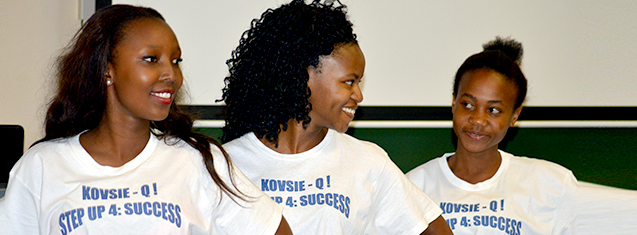Latest News Archive
Please select Category, Year, and then Month to display items
12 January 2024
|
Story Nonsindiswe Qwabe
|
Photo Sonia Small
 Since joining the UFS in 2008, Dr Grey Magaiza has worked extensively on approaches that can foster the socio-economic transformation of societies.
Since joining the UFS in 2008, Dr Grey Magaiza has worked extensively on approaches that can foster the socio-economic transformation of societies.
“The future should be one where communities can decide on their development agenda and futures. That’s the most important for me.” Dr Grey Magaiza, Deputy Director of the Centre for Gender and Africa Studies (CGAS) and Head of the Community Development programme on the Qwaqwa Campus, is passionate about capacitating communities to be agents of change and advancement. His vision for the future emphasises the empowerment of communities to take charge of their development by actively participating in decision making and the implementation of development projects that can improve their lives.
Since joining the UFS in 2008, Dr Magaiza has worked extensively on approaches that can foster the socio-economic transformation of societies. Over the years, he has crafted his research speciality into one that he is most proud of – being an interdisciplinary scientist immersed in the development of communities.
“I’m in a fortunate position of researching what I like. I say ‘fortunate’, because I’ve taken the time to understand what I’m passionate about, which is the overall field of rural livelihoods and livelihood futures – in short, community development. My research starts from an engaged university, understanding the elements that a university must use to enhance transformation and relevance to its immediate community in terms of development.”
One of the ways he has done this is by looking at social entrepreneurship as a development approach for young people in a rural setting. Through workshops with non-profit and civic organisations in Qwaqwa, Dr Magaiza has been helping these organisations to map out their needs and actively meet them through the involvement and support of external role players.
“We understand that communities are part of the national development agenda, but even that national agenda respects community knowledge and intentions and allows communities to shape their identity. A critical enabler of this is community organising. You bring back the capacity in communities to have dialogues on issues affecting them as spaces for engagement, knowledge exchange, and for people to just talk about their way forward.”
By enabling communities to define their development agenda, they can address their specific needs, challenges, and aspirations, he said. “When I look at livelihood futures, it’s quite an exciting aspect of my work – it’s like looking into a fortune tellers’ globe, because you’re not deciding for communities what they should do, but the communities themselves take those decisions.”
The beginning of the person you want to be
2015-01-29

“The University of the Free State is a caring community where everybody counts.” With this message, Dr Choice Makhetha, Vice-Rector: External Relations welcomed our first-years on the Qwaqwa Campus.
“Whether you are a first-year or a senior student, whether you are a cleaner or a research professor, we all have one thing in common: our humanity,” Dr Makhetha said.
“This is the stage where you are going to shape the person you want to be,” Dr Makhetha said to the audience of eager first-year students who had already spent a week undergoing a rigorous Gateway Orientation programme.
“A lot of things will happen during your stay here and one of them is making friends. Make friends with people from outside your comfort zone,” Dr Makhetha added. “Make friends with those who have a totally different background from yours so that you can learn, broaden and enrich your life.”
“Read broadly and ask questions – for questions will take you far beyond your area of study,” she said.
Zethu Mhlongo, Deputy President of the Qwaqwa Campus Student Representative Councisel (SRC), encouraged first-years to always remember why they chose our university in the first place.
“Enjoy your stay, get your degree and step up for success,” Mhlongo said.